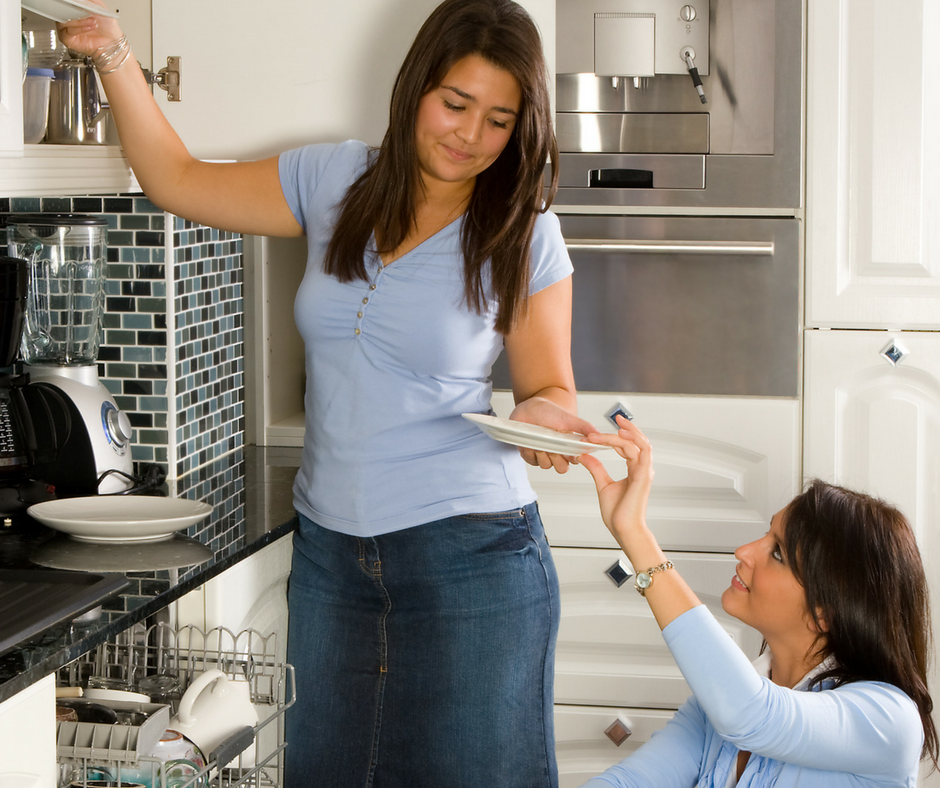“Pick up your clothes off the floor”, “throw that used tissue in the trash,” “take your plate and cup to the kitchen”, and on and on…how many times do we as moms say (and often yell) these statements throughout the day?! Unfortunately, the answer is ALL THE TIME! We all struggle to help our kids become and stay organized.
Not only will teaching your kids to become more organized leave you with fewer chores around the house and more time for yourself (whether you have help at home or not), it also teaches them the very valuable trait of responsibility which they will need to carry with them into adulthood.
Whether we realize it or not, if we are always cleaning up after our kids, we teach them that there will always be somebody to pick up after them. The same applies if you have a housekeeper or nanny. And if for any reason your help isn’t around, guess who still has to do the work? Mom of course.
 It’s super important for me to have an organized house and to teach my kids about responsibility and how to care for their things. I have tried many tips–some worked, some not so much–and all with mixed results with my children: One is super organized; one is completely unorganized and one is more or less in the middle–if she finds someone to pick up after her she gets lazy, but when she’s alone at university, she’s on track. So take these tips and experiment and see which ones work better for you. The important thing is to be consistent no matter which tip you’re following. If you’re not consistent, they won’t take you seriously and it will be a case of “whatever..mom’s just trying something new on us again…”
It’s super important for me to have an organized house and to teach my kids about responsibility and how to care for their things. I have tried many tips–some worked, some not so much–and all with mixed results with my children: One is super organized; one is completely unorganized and one is more or less in the middle–if she finds someone to pick up after her she gets lazy, but when she’s alone at university, she’s on track. So take these tips and experiment and see which ones work better for you. The important thing is to be consistent no matter which tip you’re following. If you’re not consistent, they won’t take you seriously and it will be a case of “whatever..mom’s just trying something new on us again…”
1. Walk the Talk
If you aren’t organized, chances are your kids will have a hard time being organized as well. You are your child’s role model. They look up to you and try to copy you always. Chances are, if you don’t toss your clothes and throw your shoes around, or depend on your housekeeper to keep everything tidy, your kids won’t either. Simple as that.
2. Decide on Chores Together
Sit down and chat with your kids about what you expect them to do around the house and what they should expect from you too. Raising awareness around everyone’s role and what they should do makes everyone happier. Explain to them that their personal stuff is their own responsibility and accordingly, they should be in charge of the neatness of their bedrooms or playrooms. If their friends come over and find them organized, they will enjoy their playtime together saving themselves the hassle of wasting time looking for lost toys and missing parts.
3. Limit Your House Help’s Chores
No matter how many people help you around the house, always keep a number of chores that are your kids’ responsibility only and make it clear that they’re not allowed to ask anyone to do these chores for them. To name a few: tidying up their bed; putting their clothes in the laundry basket; taking their plates to the sink when they are done eating; tidying up their toys; and packing their school bag and school supplies every night. Make it easier for them by providing sorting boxes, drawer organizers, and designated baskets with labels to make their chores more fun.
4. Follow Through With Consequences
Classic mom scenario: you repeat things a zillion times a day and no one listens to what you say because you aren’t firm or consistent enough with FOLLOWING UP. You have to mean what you say and follow through with consequences, not simply make empty threats (guilty here). So, if your kids do not comply with your house rules (or anything that you have agreed upon), there has to be a consequence. I’ll leave the particular consequence up to you but once you decide on one, implement it without hesitation consistently and you will see how oftentimes the lesson is learned quite quickly.
5. Incentive
s/ Reward Charts
These actually work! Put up a reward chart, where your kids gain points for tidiness and organization of their rooms and toys. Once they have a certain number of points you’ve previously agreed on, they get a small reward. This is a great incentive to reinforce their behavior and encourage its continuity.
Like I said, kids are different and what works for one doesn’t necessarily work for another. Experiment a bit until you figure out what best works for all of you–let me know how it goes!
